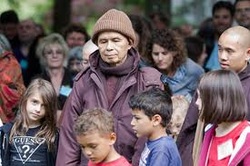
Thich Nhat Hahn’s response to a child’s question:
“Why do we have to die one day?”
The following is an excerpt from "The Mindfulness Bell”, #31.
"Imagine there is only birth, no death. One day there will be hardly any place to stand on earth. To die means to leave the place for our children. And who are our children? Our children are ourselves. Our children are our new manifestations. The son is the continuation of the father. The father looking at his son has the feeling that he will not die because his son is there to continue him. Looking like that you see that you are not dying, you are continuing in your son. And your son is not dying because he is continued in the grandson and so on. Buddhist meditation helps us to look deeply to see that there is no real dying only continuation in different forms.
Look at the cloud in the sky. The cloud may be afraid of dying. But there is a time when the cloud has to be transformed into rain and to fall down. But that is not really dying. That is changing form. The cloud changes into the rain and the cloud continues in the rain. If you look deeply into the rain you can see the cloud. There is no real dying. You continue to be in many other forms. The cloud can continue in the form of snow, in the form of rain, in the form of a river, or in the form of ice. One day the cloud can become ice cream. If the cloud does not die, how can we have ice cream to eat?. . .
You know that death is very important for birth, for our continuation. In our body there are many cells that die every minute in order to leave space for new cells to be born. Birth and death take place every minute in our body. If there is no death it is impossible for us to continue in our body. That is why birth and death are linked to each other. Birth gives rise to death and death gives rise to birth. If we cry every time one of our cells dies we will not have enough tears left. If every time one of our cells dies we organize a funeral then we will spend all our time organizing funerals. That is why we have to see that birth and death take place every moment in us. That is why the role of death is very important... looking deeply you don't see birth and death, you see a continuation."
“Why do we have to die one day?”
The following is an excerpt from "The Mindfulness Bell”, #31.
"Imagine there is only birth, no death. One day there will be hardly any place to stand on earth. To die means to leave the place for our children. And who are our children? Our children are ourselves. Our children are our new manifestations. The son is the continuation of the father. The father looking at his son has the feeling that he will not die because his son is there to continue him. Looking like that you see that you are not dying, you are continuing in your son. And your son is not dying because he is continued in the grandson and so on. Buddhist meditation helps us to look deeply to see that there is no real dying only continuation in different forms.
Look at the cloud in the sky. The cloud may be afraid of dying. But there is a time when the cloud has to be transformed into rain and to fall down. But that is not really dying. That is changing form. The cloud changes into the rain and the cloud continues in the rain. If you look deeply into the rain you can see the cloud. There is no real dying. You continue to be in many other forms. The cloud can continue in the form of snow, in the form of rain, in the form of a river, or in the form of ice. One day the cloud can become ice cream. If the cloud does not die, how can we have ice cream to eat?. . .
You know that death is very important for birth, for our continuation. In our body there are many cells that die every minute in order to leave space for new cells to be born. Birth and death take place every minute in our body. If there is no death it is impossible for us to continue in our body. That is why birth and death are linked to each other. Birth gives rise to death and death gives rise to birth. If we cry every time one of our cells dies we will not have enough tears left. If every time one of our cells dies we organize a funeral then we will spend all our time organizing funerals. That is why we have to see that birth and death take place every moment in us. That is why the role of death is very important... looking deeply you don't see birth and death, you see a continuation."